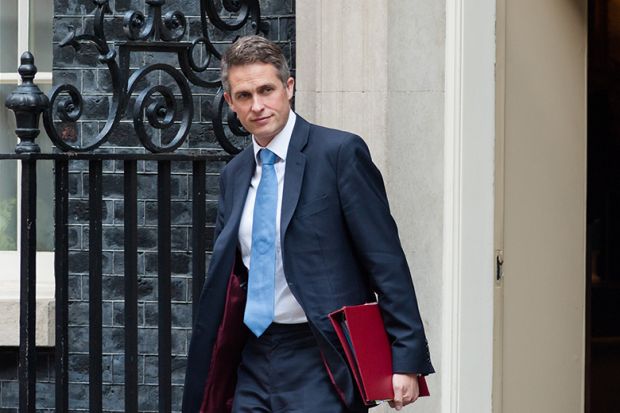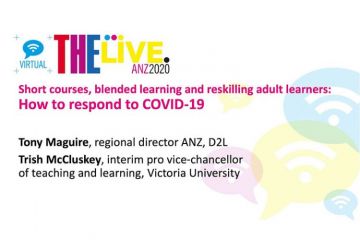The use of so-called conditional unconditional offers by English universities has “got to come to an end”, while there ought to be restrictions on the total number of unconditional offers made, perhaps via a grade threshold or cap, education secretary Gavin Williamson has said.
Mr Williamson, who also said that the government would issue its response to the Augar review of post-18 education in England “before the end of the winter”, made the comments following a speech at Universities UK’s annual conference, at the University of Birmingham.
Sector figures welcomed the overall positive tone of the speech – Mr Williamson’s first major speech since being appointed in July – which described universities as a “national treasure”.
But Mr Williamson emphasised his disapproval of the increase in the number of unconditional offers being made to school students from England, Wales and Northern Ireland, from 3,000 in 2013 to 76,000 this year.
He expressed particular concern about the use of conditional unconditional offers – conditional offers that become unconditional if applicants choose that institution as their first choice. Universities made 80,785 of these this year, but the English regulator, the Office for Students, has previously said that the practice was “akin to pressure selling”.
“I’m delighted that some universities have already scrapped making so-called conditional unconditional offers and I hope that the rest will soon follow suit,” Mr Williamson said in his speech.
“Universities UK and [the Office for Students’] reviews of admissions are an opportunity for the sector to get its house in order here, perhaps by agreeing a minimum predicted grade threshold, or a maximum proportion of students who may be offered one.”
Speaking to reporters afterwards, Mr Williamson clarified his comments. “I don’t think there is any place for conditional unconditional offers at all. I don’t see any reason why any institution should be offering [them],” he said. Such offers were limiting students’ choices and “restricting people’s opportunities”, Mr Williamson warned.
Mr Williamson added that the government was “encouraging people to move away from unconditional offers”. “We believe there are different ways that we can actually do this,” Mr Williamson said.
But conditional unconditional offers “have got to come to an end”, he added.
Mr Williamson will be writing to the Office for Students, on issues including admissions, next week.
Vice-chancellors have previously expressed concern that the OfS’ review of admissions – running alongside the UUK exercise – could infringe on institutional autonomy.
On the post-18 education review, which recommended a reduction in tuition fees to £7,500, Mr Williamson said the government would be “going into some detail” in its response to the panel’s report.
Addressing the government’s move this week to reintroduce post-study work visas – abolished by Theresa May as home secretary in 2012 – Mr Williamson may have raised some eyebrows with his tone.
“When I took on this job, you told me that you wanted the post-study graduate route more than anything else. Well, we listened and the prime minister and I have given you what you asked for,” Mr Williamson said.
He added: “I see this as a deal. I expect you, in exchange, to drive greater access to your institutions.”
The Boris Johnson government’s move on visas this week will be regarded by many as simply the reversal of a harmful policy introduced by a previous Conservative government – a policy that damaged the national economy as well as universities.
On Brexit, Mr Williamson offered some reassurance on the UK’s continued participation in Erasmus+, but also said that if did not happen, a UK scheme could be developed.
He said in his speech: “I want to reassure you that my department is open to continuing to be part of schemes like Erasmus+. But we have to prepare for every eventuality and it is sensible to consider all options.
“As such I have asked my officials to provide a truly ambitious scheme if necessary.”
Chris Skidmore, the universities and science minister, made his first speech at the conference since returning to the post, and addressed the government’s Brexit position.
“We want to get a deal with the EU which will protect our continuation in Horizon 2020 and continue our participation in Erasmus+,” he said.
“We will be fully exploring the option of participating in the next Erasmus programme. We are also developing potential alternatives which are ambitious and truly global.”
He added on the EU’s research programmes: “We are working hard to secure full association into the successor scheme to Horizon 2020, Horizon Europe. I’ll personally be doing everything in my power…to achieve this.”
Register to continue
Why register?
- Registration is free and only takes a moment
- Once registered, you can read 3 articles a month
- Sign up for our newsletter
Subscribe
Or subscribe for unlimited access to:
- Unlimited access to news, views, insights & reviews
- Digital editions
- Digital access to THE’s university and college rankings analysis
Already registered or a current subscriber?





